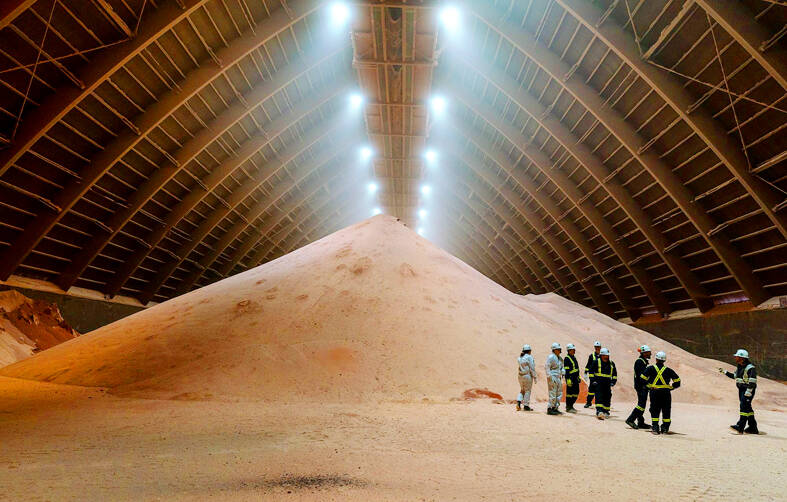The world’s largest fertilizer firm is warning of global shortages, as supplies from Russia and Belarus are more limited than anticipated.
“Russia and Belarus are just enormous producers of fertilizer,” Nutrien Ltd chief executive officer Ken Seitz said on Thursday.
“There are export challenges in the region. That’s certainly going to have a material impact on the markets,” he said.

Photo: Bloomberg
Two of the biggest producing nations of potash — a key type of fertilizer — ended up exporting less due to trade restrictions and war.
Seitz sees shipments from Belarus at half those of last year, after earlier expecting them to be down by one-third to two-thirds, and Russian exports down by about 25 percent.
“The world is going to have to look to the other breadbaskets of the world to fill that supply gap for food,” he said.
A global shortage of fertilizer might seem like a distant problem to the billions of people who do not work in agriculture.
However, crop nutrients are critical to growing the crops that feed the world’s growing population.
Fertilizer shortages can lead to higher costs and lower yields, ultimately hitting consumers when food prices have soared.
About 60 percent of new production that was expected to come into the market over the next five years was in Russia and Belarus, he said, adding that it is unclear how much of that would come online.
Meanwhile, demand continues to rise as the world’s population grows.
The Saskatchewan-based company has said it would ramp up potash output capability to 18 million tons by 2025, a 40 percent increase compared with 2020.
If the market changes, the company can reevaluate additional production, Seitz said.
Fertilizer prices are falling from the highest levels seen in years, as farmers postpone purchases to await lower prices, creating gluts that are upending the market for crop inputs.
It is a reversal from earlier this year, when prices surged after Russia’s invasion of Ukraine threw the world’s crop-nutrient sector into disarray.
Potash had seen price increases because of sanctions on Belarus.
Farmers worldwide would need to restock nutrients after they applied most of their stored product this year.
Global shortfalls could linger well into next year, Seitz said.
“For 2023, we really don’t see any reason why that would change,” he said.
“As we watch the trade flows now — especially given where potash prices are at and have been — those producers are looking for every outlet that they can find and that they’ve now exhausted those outlets,” Seitz said.
Nutrien is seeing prepaid sales of fertilizer — where farmers buy ahead to secure product — about 15 to 20 percent higher than in 2020.
Farmers who did not buy this year and have used all their stored product are expected to jump into the market and send prices high again, Seitz said.
“We believe 2023 is not a demand concerned world, but a supply concerned world,” Seitz said. “There’s not gonna be enough potash to go around.”

The demise of the coal industry left the US’ Appalachian region in tatters, with lost jobs, spoiled water and countless kilometers of abandoned underground mines. Now entrepreneurs are eyeing the rural region with ambitious visions to rebuild its economy by converting old mines into solar power systems and data centers that could help fuel the increasing power demands of the artificial intelligence (AI) boom. One such project is underway by a non-profit team calling itself Energy DELTA (Discovery, Education, Learning and Technology Accelerator) Lab, which is looking to develop energy sources on about 26,305 hectares of old coal land in

Taiwan’s exports soared 56 percent year-on-year to an all-time high of US$64.05 billion last month, propelled by surging global demand for artificial intelligence (AI), high-performance computing and cloud service infrastructure, the Ministry of Finance said yesterday. Department of Statistics Director-General Beatrice Tsai (蔡美娜) called the figure an unexpected upside surprise, citing a wave of technology orders from overseas customers alongside the usual year-end shopping season for technology products. Growth is likely to remain strong this month, she said, projecting a 40 percent to 45 percent expansion on an annual basis. The outperformance could prompt the Directorate-General of Budget, Accounting and

Netflix on Friday faced fierce criticism over its blockbuster deal to acquire Warner Bros Discovery. The streaming giant is already viewed as a pariah in some Hollywood circles, largely due to its reluctance to release content in theaters and its disruption of traditional industry practices. As Netflix emerged as the likely winning bidder for Warner Bros — the studio behind Casablanca, the Harry Potter movies and Friends — Hollywood’s elite launched an aggressive campaign against the acquisition. Titanic director James Cameron called the buyout a “disaster,” while a group of prominent producers are lobbying US Congress to oppose the deal,

Two Chinese chipmakers are attracting strong retail investor demand, buoyed by industry peer Moore Threads Technology Co’s (摩爾線程) stellar debut. The retail portion of MetaX Integrated Circuits (Shanghai) Co’s (上海沐曦) upcoming initial public offering (IPO) was 2,986 times oversubscribed on Friday, according to a filing. Meanwhile, Beijing Onmicro Electronics Co (北京昂瑞微), which makes radio frequency chips, was 2,899 times oversubscribed on Friday, its filing showed. The bids coincided with Moore Threads’ trading debut, which surged 425 percent on Friday after raising 8 billion yuan (US$1.13 billion) on bets that the company could emerge as a viable local competitor to Nvidia